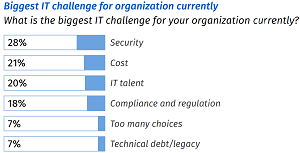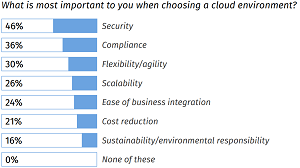News
Supply Chain, Inflation Challenge Skills Dearth as Top Cloud Problem
While finding skilled workers has long plagued the cloud computing space, a new survey-based report shows some new challenges emerging, such as supply chain shortages and rising inflation.
As we have reported many times, the skills shortage is cited again and again in cloud computing surveys, and the new Multicloud Annual Research Report 2022 from Rackspace Technology, based on a survey of 1,420 senior IT decision-makers, is no exception.
"The dearth of IT talent ... was cited as the top business challenge by over half (53 percent) of IT decision-makers," the report said. "As a result, a major strategic priority is confronting the talent shortfall by increasing the focus on recruitment and retention."
 [Click on image for larger view.] Top IT Challenges (source: Rackspace Technology).
[Click on image for larger view.] Top IT Challenges (source: Rackspace Technology).
However, Rackspace noted that the talent shortage is sandwiched in between two other concerns that have emerged more recently while listing the top three business challenges:
- Supply chain disruption was the top concern of respondents, with 61 percent citing supply chain in their list of the top three challenges affecting their business.
- 53 percent said they believe the IT talent shortage poses a critical challenge, with the Great Resignation showing no signs of abating after a record number of 2021 employee departures worldwide.
- Since inflation is not as short-term a reaction to the pandemic as previously believed, 48 percent mentioned price inflation as among their top three business challenges.
Also top of mind -- as always -- is security. Some 46 percent of respondents cited security as the most important factor to consider when choosing a cloud environment, followed by: compliance (36 percent); flexibility/agility (30 percent); and scalability (26 percent). Security was also reported to be the leading reason companies use external partners.
 [Click on image for larger view.] Cloud Choice Factors (source: Rackspace Technology).
[Click on image for larger view.] Cloud Choice Factors (source: Rackspace Technology).
"Taken together, the data points on talent and security tell an interesting story," said Jeff DeVerter, chief technology evangelist at Rackspace. "Nearly 85 percent of our survey respondents either have or will have applications running on serverless as they look to accelerate their cloud transformation efforts. At the same time, they face a severe internal skills shortage that is preventing them from being more aggressive without tapping external partners."
Other data highlights of the report include:
- Organizations' cloud priorities evolving, from "basics" such as agility (30 percent) and scalability (26 percent) and toward more sophisticated issues such as security (46 percent) and compliance (36 percent)
- 56 percent of respondents say they won't even own a datacenter in five years
- An increased appetite for risk among IT professionals can be seen in their enthusiasm for exploring edge technologies (38 percent) and containers (53 percent), while over half plan to invest in hyperscale providers
- 42 percent are willing to take more risks vs. a year ago as we emerge from the pandemic. In the pandemic uncertainties of 2020 and 2021, business leaders were cutting programs and limiting investment and risk
-
Most popular public cloud combinations are:
- 6 percent use (or plan to use) AWS and Azure, but not Google Cloud
- 14 percent use (or plan to use) AWS and Google Cloud, but not Azure
- 12 percent use (or plan to use) Google Cloud and Azure, but not AWS
- 9 percent of respondents indicated use of (or intention to use) all three hyperscalers
-
When asked how the cloud is aiding innovation:
- 49 percent say it is improving customer experience and ease of use
- 44 percent say is enabling faster testing and deployment of new products and services
- 37 percent say it is providing limitless compute and storage
- 35 percent say it is expanding their range of products/services
- 33 percent say it provides the ability to scale up and down on demand
- 74 percent of respondents say employees prefer working from home. Just over two-thirds (69 percent) say staff works longer hours from home, with 66 percent citing burnout among IT employees
- Serverless tech has the biggest impact on automating workflows (45 percent), scaling IoT applications (38 percent), virtual assistants/chatbots (34 percent), and running/hosting SaaS functions (32 percent)
"The cloud is no longer a shiny new object -- it is a nearly universally accepted technology, and there is almost no organization that is not currently in the process of transforming itself via the cloud," said DeVerter. "At the same time, there are a number of barriers standing in the way of that transformation, most notably a dearth of IT talent. More than ever, organizations will need to rely on external expertise to achieve their cloud goals, as they continue to shed legacy infrastructure and ask the cloud to do more."
The survey was conducted by Coleman Parkes in April 2022, targeting 1,420 senior IT decision-makers across multiple key sectors in the USA, LATAM, EMEA and APAC.
About the Author
David Ramel is an editor and writer at Converge 360.